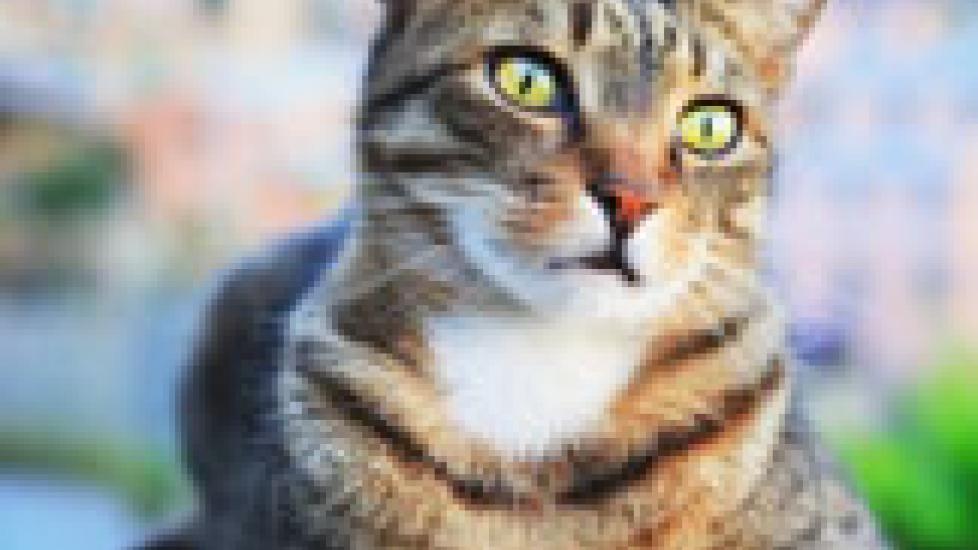Seven Most Common Illnesses in Senior Cats
- Chronic renal (kidney) disease.
Disease affecting the kidneys is a common affliction in older cats. Essentially, the kidneys act as a filter system, removing many of the waste products produced by your cat’s body. Once filtered from your cat’s blood, these waste products are eliminated via the urine. When the kidneys are damaged, either by aging changes or by any other process, the waste products are no longer filtered effectively, leading to a buildup of these products in your cat’s blood stream. This buildup of waste products in the blood is known as azotemia.
Symptoms seen with chronic renal disease include increased thirst, an increase in urine volume, weight loss, a lack of appetite, and vomiting.
- Heart disease.
Heart disease is common in senior cats also. There are many different types of heart disease. One of the most commonly seen in cats is cardiomyopathy, a disease of the heart muscle. Degenerative valvular disease and other types of heart disease can be seen as well. Regardless of the underlying cause, the end result of heart disease is congestive heart failure, or CHF, in which the heart’s ability to pump blood effectively and efficiently is compromised.
- Diabetes mellitus.
Diabetes results in an increased blood glucose, or blood sugar, level. Risk factors for feline diabetes include being overweight and leading a sedentary lifestyle. Most cats diagnosed with diabetes will require insulin injections. Remission of diabetes is possible when aggressive treatment is instituted early in the disease, before the pancreas becomes “burned out” trying to produce enough insulin to regulate the increased glucose level. If remission occurs, insulin will no longer be necessary. However, if remission is not possible, insulin injections will remain necessary for the remainder of your cat’s life.
- Arthritis.
Arthritis occurs more commonly in older cats than many cat owners realize. Unfortunately, the symptoms of arthritis are often mistaken as “normal” aging changes. Arthritic cats often become less active, sleep more, and may not be able to access perches and other elevated surfaces any longer. The pain associated with arthritis can significantly alter your cat’s quality of life if not addressed though.
- Hyperthyroidism.
Hyperthyroidism is a disease of the thyroid gland in which excessive amounts of thyroid hormone are produced. The excessive hormone has a number of different effects on your cat. Many hyperthyroid cats display weight loss despite an increased, sometimes even ravenous, appetite. Other symptoms are varied but may include vomiting, diarrhea, increase in water consumption, and increase in urine volume.
- Dental disease.
Dental disease is not specific to older cats. In fact, it is estimated that at least 2/3 of cats over three years of age suffer from dental disease. Needless to say, dental disease can be a serious issue for senior cats. Dental disease is a painful disease that can affect your cat’s appetite and cause weight loss.
- Cancer.
It probably comes as no surprise that cancer is also common in older cats. There are many types of cancer that can affect cats. Symptoms will depend on the type of cancer involved.
Senior cats may be plagued by more than one of diseases at the same time. Some cats may struggle with several different diseases, making diagnosis and management of these cats more challenging.
Senior cats require regular veterinary care. All cats should be examined by a veterinarian at least yearly but, for senior cats, twice yearly may be more appropriate. These veterinary visits are the best way to stay on top of your cat’s health. Most illnesses are easier to treat if diagnosed early. Early diagnosis and treatment may extend your cat’s life and contribute significantly to your cat’s quality of life.
A veterinary visit should consist of, at a minimum, a thorough physical examination. Your veterinarian likely will also need to perform blood and urine tests. In some cases, other testing (such as radiographs or X-rays) may be necessary as well.
Do not assume that, as a cat owner, you will always be able to tell when or if your cat is ill. Cats are great at masking sickness and senior cats are no exception. Working with your veterinarian is mandatory to keep your cat in the best possible health. This is particularly true with senior cats who, by virtue of their age, are more likely to suffer from disease.

Dr. Lorie Huston
Image: Thinkstock
